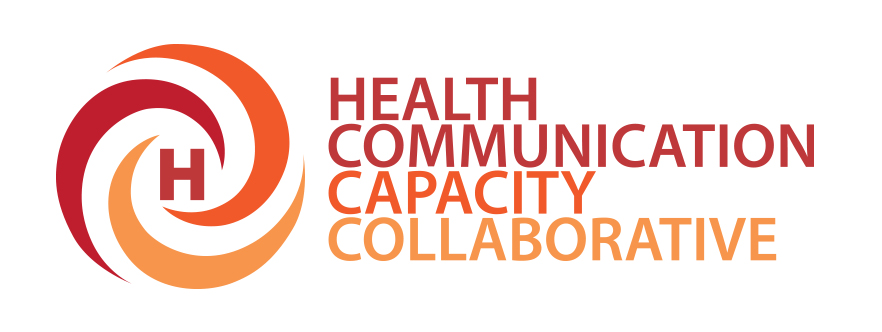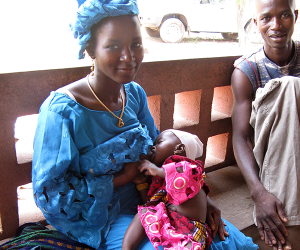Illustrative Example: Define a Message Strategy (Step 4)
| Reminder: It is important to remember that audiences respond better to “small doable actions” rather than requests to make big changes all at once. Similarly, it is important to note that fewer messages will have a greater impact and that providing too many messages runs the risk of losing and confusing your audience. Between three to five messages per audience is usually a good rule to follow. The sample messages here and in Appendix C provide a wide range of possibilities that could be used. Individual programs need to decide what works best within their country context based on their situation or audience analysis. | |
| Don’t: | Do: |
|
|
Primary Audiences
| PRIMARY AUDIENCE 1: PREGNANT WOMEN AND MOTHERS OF CHILDREN 0-24 MONTHS | ||
| OBJECTIVES | ||
|
From 2014 to 2019, increase the number or percentage of pregnant women and mothers of children 0-24 months, at all levels of parity and marital status, who:
|
||
| POSITIONING | ||
| Optimal breastfeeding gives your baby a good start in life. It is a given in our faith and in many ways a natural vaccine. | ||
| KEY PROMISE | ||
| Early and exclusive breastfeeding for the first six months and complementary feeding until age two will prevent all kinds of illnesses and could save your baby’s life. Your child will be healthier and quite possibly smarter. | ||
| SUPPORT STATEMENT | ||
| All over the world and in communities like yours, babies who are breastfed are much less likely to get common childhood illnesses such as diarrhea and pneumonia. They are also much less likely to die. If all newborns were given breast milk in the first hour life, many more of them would survive that first critical month. Infants who are not breastfed until they are one or two days old can be three or four times more likely to die. Young infants given some foods and liquids in addition to breast milk can be four times more likely to die than exclusively breastfed young infants. Introducing water, tea, formula, and other foods too early can expose them to harmful bacteria. These foods also do not have all the nutrients and immunity-building properties that breast milk has. Feeding these foods to babies means that they consume less of the more beneficial breast milk than they need. Our religious texts have always recognized the importance of breastfeeding not only for food but also for comfort and closeness. | ||
| KEY MESSAGES | ||
Reminder: Key messages must be tailored to the specific context. Different regions or ethnic groups have different reasons for their breastfeeding practices and different beliefs about colostrum, what makes babies grow, and related issues. To be effective, messages must address relevant benefits, concerns, and practices. They should be based on evidence from well-conducted studies designed to shed light on people’s breastfeeding beliefs and practices. In addition to highlighting benefits, breastfeeding messages should emphasize the risks of mixed feeding within the first six months and artificial feeding. Provide key information and actions audience members can take in a simple, easy-to-understand, non-threatening, respectful way. |
||
| PRIMARY AUDIENCE 2: GRANDMOTHERS AND FAMILY MEMBERS WHO PROVIDE NEWBORN CARE | ||
| OBJECTIVES | ||
From 2014 to 2019, increase the percentage/number of grandmothers and family members who:
|
||
| POSITIONING | ||
| Ensuring early and exclusive breastfeeding from birth is the best and most natural thing families can do for their newest member to give them a good start in life. Our faith presumes this, and the whole world is re-learning it. | ||
| KEY PROMISE | ||
| Children who are breastfed optimally are more likely to be healthy and survive those critical first months. By supporting exclusive breastfeeding for the first six months, and continued breastfeeding while providing complimentary food from age 6 months to 2 years, family members are protecting the health of mother and child. They are giving the baby a good start in life. | ||
| SUPPORT STATEMENT | ||
| The Qur’an, Bible, and other religious teachings highlight the benefits of breastfeeding. Grandmothers and other family members are practicing their faith when they take steps to ensure the best possible care of the newborn. In many communities, grandmothers and other family members help the new mother breastfeed successfully. In many communities, grandmothers and other family members help the new mother breastfeed successfully.Early and exclusive breastfeeding for the first six months is one of the first and most important choices made for the newborn. Infants who are not breastfed until they are one or two days old can be three or four times more likely to die. Infants given some foods and liquids in addition to breast milk during the first six months can be four times more likely to die than exclusively breastfed young infants. Caregivers who help encourage breastfeeding and discourage mixed feeding have a very positive impact on their families. | ||
| KEY MESSAGES | ||
Key messages for grandmothers and other caregivers should emphasize the benefits of breast milk and the risks of formula and mixed feeding.
|
||
Influencing Audiences
| INFLUENCING AUDIENCE 1: FATHERS | |
| OBJECTIVES | |
From 2014 to 2019, increase the percentage or number of fathers who:
|
|
| POSITIONING | |
| Given how important your child is to you, exclusive breastfeeding, complementary feeding starting at 6 months, and continued breastfeeding for 2 years can be your family’s only choice. It’s what God intended and it gives your child the best, healthiest start in life. | |
| KEY PROMISE | |
| Early and exclusive breastfeeding for the first six months and continued breastfeeding with complementary feeding from age 6 months to 2 years greatly improve your child’s chances of surviving childhood, being healthy, and developing the abilities he or she is meant to have. You will feel pride knowing that you are providing the best for your children and family, and giving your children the best start in life and a better future. You will be happy knowing you acted responsibility as a father, making the right choices and seeing them through. | |
| SUPPORT STATEMENT | |
Religious teachings highlight the benefits of breastfeeding. The Qur’an specifically states that
Modern studies support the importance of breastfeeding. These studies show that children who are breastfed according to global guidelines are more likely to survive than children who are not. They are also healthier in general and get diarrhea and respiratory infections a lot less. Studies also show that mothers are more likely to breastfeed if the father is supportive and encouraging. Your role is more important than you know. |
|
| KEY MESSAGES | |
Key messages for fathers should focus on their roles, the benefits of breastfeeding, and the risks of mixed and formula feeding.
|
|
| INFLUENCING AUDIENCE 2: RELIGIOUS LEADERS | |
| OBJECTIVES | |
From 2014 to 2019, increase the percentage or number of faith leaders who:
|
|
| POSITIONING | |
| God intended for women to breastfeed their children and mandated that we care for the most vulnerable. Given the emphasis on children in our religious texts and traditions, religious leaders have the moral authority to help families adopt optimal breastfeeding practices. | |
| KEY PROMISE | |
| Early and exclusive breastfeeding for the first six months and continued breastfeeding with complementary feeding from age 6 months to 2 years greatly improve children’s chances of surviving childhood, being healthy, and developing the abilities God meant them to have. Doing everything you can to support optimal breastfeeding can help you fulfill your mission. | |
| SUPPORT STATEMENT | |
Religious teachings highlight the benefits of breastfeeding. The Qur’an specifically states that:
Modern studies support the importance of breastfeeding. These studies show that children who are breastfed according to global guidelines are more likely to survive than children who are not. They are also healthier in general and get diarrhea and respiratory infections a lot less. Studies also show that mothers are more likely to breastfeed if they receive support from society and those around them. |
|
| KEY MESSAGES | |
Key messages for religious leaders should focus on their roles, the benefits of breastfeeding, and the risks of mixed and formula feeding.
Many faith communities have more than one level of leadership. The following messages are for those who have more direct contact with members than the most senior leader might.
|
|
| INFLUENCING AUDIENCE 3: FAITH COMMUNITIES | |
| OBJECTIVES | |
From 2014 to 2019, increase the percentage or number of faith community members who:
|
|
| POSITIONING | |
| God intended for women to breastfeed their children and mandated that we care for the most vulnerable. Given the emphasis on children in our religious texts and traditions, faith communities should want to help families adopt optimal breastfeeding practices. | |
| KEY PROMISE | |
| Early and exclusive breastfeeding for the first six months and continued breastfeeding with complementary feeding from age 6 months to 2 years greatly improve children’s chances of surviving childhood, being healthy, and developing the abilities God meant them to have. Doing everything you can to support optimal breastfeeding can help you fulfill your mission. | |
| SUPPORT STATEMENT | |
The Qur’an, Bible, and other religious teachings emphasize the benefits of breastfeeding. The Qur’an specifically states that:
Modern studies support the importance of breastfeeding. These studies show that children who are breastfed according to global guidelines are more likely to survive than children who are not. They are also healthier in general and get diarrhea and respiratory infections a lot less. Studies also show that mothers are more likely to breastfeed if she receives support from society and those around her. |
|
| KEY MESSAGES | |
Key messages for faith communities should focus on their roles, the benefits of breastfeeding, and the risks of mixed and formula feeding.
|
|


